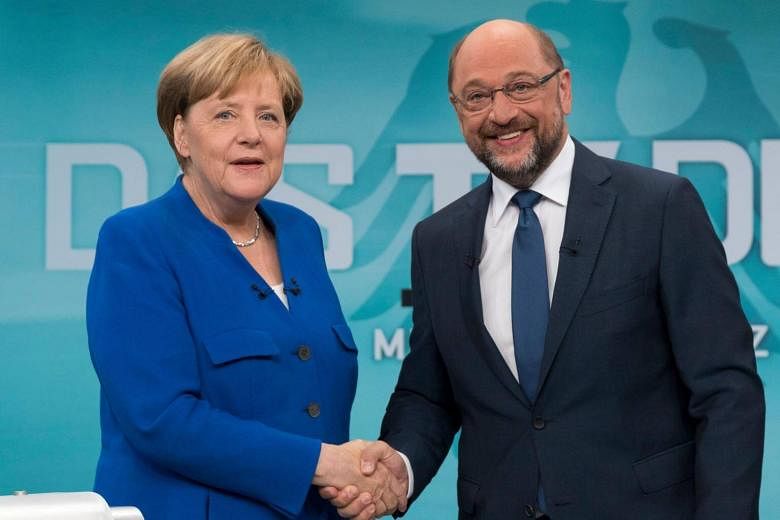BERLIN (REUTERS) - A top leader of German Chancellor Angela Merkel's conservative party said her website had been hit by thousands of cyber attacks - many from Russian IP addresses - before Sunday's (Sept 3) televised election debate.
German intelligence and government officials have often voiced concerns that Moscow could seek to interfere in the Sept 24 national election, in which Dr Merkel is widely expected to win a fourth term.
Russia has repeatedly denied trying to influence foreign elections.
Ms Julia Kloeckner, vice chairman of Dr Merkel's Christian Democratic Union (CDU), said on Monday (Sept 4) that her political website had seen some 3,000 attacks on Sunday before the debate between Dr Merkel and Social Democratic leader Martin Schulz.
Following a pattern seen in earlier hacks, the CDU's headquarters in the state of Rhineland-Palatinate, where Ms Kloeckner is the party's leader, also experienced "massive attacks" ahead of the debate, she said.
"Many of the senders have Russian IP addresses," Ms Kloeckner added.
German authorities have blamed a spate of cyber attacks directed at the German parliament, individual lawmakers, political parties and political think-tanks since summer 2015 on APT 28, a Russian hacker group with links to Moscow.
Ms Kloeckner did not say how the attacks had been discovered or what form they had taken. Many recent cyber attacks targeted at German politicians and institutions have used phishing schemes that include attachments with malicious software.
Germany's BSI federal cyber protection agency said it was aware of the incidents and was in touch with the CDU headquarters in the state, a spokesman said.
Officials with the headquarters of the CDU and the Social Democrats, junior partners in the ruling coalition, said they had not seen a wave of similar attacks on their websites.
Mr Hans-Georg Maassen, the head of Germany's BfV domestic intelligence agency, told reporters in July that Berlin expected Russia to try to influence this month's election and said he suspected that Russian President Vladimir Putin would prefer a different German chancellor than Dr Merkel.
Dr Merkel backs continued sanctions against Russia for its actions towards Ukraine. Relations between Germany and Russia have been cool in recent years, although Germany is highly dependent on energy supplies from Russia.
A spokesman for the German interior ministry told a news conference on Monday that cyber attacks directed at political parties had increased generally in recent months, but declined to comment on the latest incidents.
He noted the BSI had been working closely with politicians and parties to increase security.
Experts said hackers were increasingly going after subsidiary sites such as those of local party branches in the hope of finding vulnerabilities.
Mr Tyson Barker, programme director of the Aspen Institute Deutschland think-tank, said the attacks on a state-level CDU party infrastructure continued a pattern of hackers probing for potential weak links in the broader political system.
"The main battle front in this hybrid war - in the US as in Germany - will likely be in the states, not Berlin or Washington, said Mr Barker, adding: "Those who thought Russian intelligence was going to sit this one out seem to have been proven wrong."

